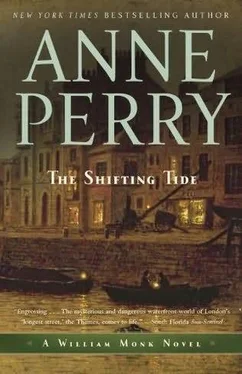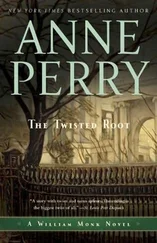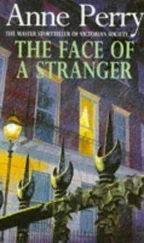Anne Perry - The Shifting Tide
Здесь есть возможность читать онлайн «Anne Perry - The Shifting Tide» весь текст электронной книги совершенно бесплатно (целиком полную версию без сокращений). В некоторых случаях можно слушать аудио, скачать через торрент в формате fb2 и присутствует краткое содержание. Жанр: Исторический детектив, на английском языке. Описание произведения, (предисловие) а так же отзывы посетителей доступны на портале библиотеки ЛибКат.
- Название:The Shifting Tide
- Автор:
- Жанр:
- Год:неизвестен
- ISBN:нет данных
- Рейтинг книги:5 / 5. Голосов: 1
-
Избранное:Добавить в избранное
- Отзывы:
-
Ваша оценка:
- 100
- 1
- 2
- 3
- 4
- 5
The Shifting Tide: краткое содержание, описание и аннотация
Предлагаем к чтению аннотацию, описание, краткое содержание или предисловие (зависит от того, что написал сам автор книги «The Shifting Tide»). Если вы не нашли необходимую информацию о книге — напишите в комментариях, мы постараемся отыскать её.
The Shifting Tide — читать онлайн бесплатно полную книгу (весь текст) целиком
Ниже представлен текст книги, разбитый по страницам. Система сохранения места последней прочитанной страницы, позволяет с удобством читать онлайн бесплатно книгу «The Shifting Tide», без необходимости каждый раз заново искать на чём Вы остановились. Поставьте закладку, и сможете в любой момент перейти на страницу, на которой закончили чтение.
Интервал:
Закладка:
“There’ll be other ships, won’t there?” Monk asked, leaning on the railing of the pier and watching the dark water churn beneath him. The barges going past, following the tide, were so heavily laden that in places the decks were awash.
“Course, but losin’ counts,” Duff replied, pulling a clay pipe out of the pocket of his coat, knocking the dottle out, then shredding tobacco with the fingers of his other hand before stuffing the shreds into the bowl. “Lose one fight, an’ the next time you start out two steps be’ind, like. People don’ back yer no more. Folks as used ter be scared o’ yer all of a sudden find out they’re more scared o’ someone else.” He put the pipe in his mouth and struck a match to light it, inhaling slowly. “Winnin’ an’ losin’ ’as their own rules,” he went on. “The more it goes one way, the more folks foller the tide, like. When it turns, that’s it. Yer don’ wanna lose, mister. Like rats, they are. The cowards leave yer, the bad ones turns on yer, all teeth an’ claws. If yer made enemies, losin’ is the beginnin’ o’ the end. The big bastards can’t afford ter lose. The likes o’ you an’ me it don’ matter, we done it afore, an’ we’ll be low awhile, then we’ll come back.”
Monk could see the profound truth of that. No wonder Louvain needed his ivory back. And that explained why there was no word of it anywhere along the river. It had not been sold; it was stored, hidden so the loss of it wrought the maximum damage to Louvain.
He thanked Duff and left. He needed to know more about Culpepper so he could find out where the ivory was. It would mean endless small questions. He would have to disguise them, or word would creep back to Culpepper. At best he would move the ivory and Monk would have to start all over again. If Culpepper was nervous, or angry enough, he would even sink it in the Thames mud, and it might never be found. There was the chance he had done that anyway, but surely he would not willingly destroy a cargo of that much value?
Monk tried several inventive stories, mostly about an heiress who had eloped, in order to question rivermen as to who and what they had seen on the river around Culpepper’s wharves on the morning of October twenty-first. For two days he stood in the cold asking painstaking questions and noting the answers almost illegibly, his hands were so stiff, his body shivering. The steps were slimy with salt and weed; the wooden piers creaked and sagged under the weight of years. The wind scythed in off the river, mist-swathed sometimes, knife-sharp in the early mornings, always the light shifting in blues and grays cut with silver shafts. Then finally he had enough.
It was the evening of October twenty-nine, as he sat at home, the kitchen stove open and stoked high, the kettle steaming, putting it all together, that he made sense of it. He had his feet in a bowl of hot water, and a pot of tea on the table, and three slices of toast made, when he saw the one fact that tied it all together.
The boatman Gould had told him that he could not have seen anyone rob the Maude Idris in the early hours of October twenty-one. Monk had verified that Gould had indeed been in Greenwich. But only in checking the ferries and lightermen in Greenwich had Monk realized that Gould had taken no fares that day. His boat had been at Greenwich, certainly, but idle! What boatman could afford that, unless he was being paid more than for working?
Gould’s boat had been at Culpepper’s wharf early in the day, and then disappeared without passengers. It had been seen as usual up in the Pool of London the day after. It answered every question if it was the boat in which the thieves had crept up to the Maude Idris , taken the ivory, and then carried it down to Culpepper at Greenwich. Whether they had done so to order, or simply taken advantage of a supreme opportunity, hardly mattered. If Louvain’s cargo had been betrayed to Culpepper by someone in his own company, that was Louvain’s problem to discover and to deal with. Once Monk had retrieved the ivory and taken it back, he had discharged his obligation. He anticipated the relief, the sudden weight lifted from him, almost as if he were free to breathe again, to stretch his shoulders and stand straight.
He went to bed early, but lay awake staring at the faint light on the ceiling thrown up from the street lamp a few yards away. He had plenty of blankets on the bed, but without Hester there was a coldness he could not dispel. Before his marriage he had dreaded the loss of privacy, the relentless company of another person preventing him from acting spontaneously, curtailing his freedom. Now loneliness crowded in on him as if he were physically chilled. When he held his breath there was silence in the room, a cessation of life itself.
Perhaps he would not have asked her what his next step should be, possibly not even told her much about the river, to save her worry when she had so many of her own anxieties to deal with. But he resented the fact that he was robbed of the choice.
And it hurt that Gould, whom he had liked, was part of the robbery which had beaten the night watchman to death. The theft of the ivory was a crime in an entirely different way. Louvain could do what he liked about that, but Hodge’s murder must be answered to the law. It was Monk’s business to see that it was.
He would have to be careful in capturing Gould. With the rope waiting for him, the boatman would fight to the death, having nothing to lose. Monk could not ask Durban for help before he had forced Gould to tell him where the ivory was and get it back to Louvain. After that he must take Gould to the police.
Whose help could he ask? Crow? Scuff? He turned over idea after idea, none of them making complete sense, until he fell asleep. His dreams were crowded with dark water, cramped spaces, shifting light, and flashes of a knife blade ending in pain as he turned on his wounded shoulder.
In the morning he was on the dockside at daybreak. The tide was flowing in fast, filling the hollows of the mud, creeping up the stone walls, and drowning the broken stumps on the old pier. The air was bitter. The broadening light had the clarity of ice, the hard, white fingers of dawn found every ripple on the water’s face, and the wind tasted of salt.
He stood alone staring at it as the sun, below the horizon, started to burn the first color into the day. Perhaps by tonight he would have finished all he had to do here. He would be paid and go back to the streets he was used to, where he knew the thieves, the informers, the pawnbrokers, the receivers-even the police. He would be able to work openly again, even if most of the cases were small.
He breathed in the icy air, savoring it, watching the light spread across the water. He would miss this. One could never stand alone in a street and see this kind of beauty.
There was life on the river already, more than just the first strings of barges, low in the water, humped with cargo. A lone boatman was busy, oars working rhythmically, rising with the eastward blade dripping diamonds.
As he looked downriver a ship caught his sight. It was just a flash of white at first, but growing as it came closer until he could make out the five tiers of sails on its towering masts: mainsails, course, lower topsails, upper topsails, topgallants, and royals billowing to catch the surprise wind. It was a shining thing, a creature of dreams, all power and grace.
He stood spellbound, oblivious of everything else: the rest of the river, other traffic, people, anyone on the dockside near him. Not until the sun was fully risen and pouring light into every corner, showing the shabby and the new, the idle and the laboring, and the clipper was at last at anchor, did he even notice that Scuff was standing next to him, his face transfigured.
Читать дальшеИнтервал:
Закладка:
Похожие книги на «The Shifting Tide»
Представляем Вашему вниманию похожие книги на «The Shifting Tide» списком для выбора. Мы отобрали схожую по названию и смыслу литературу в надежде предоставить читателям больше вариантов отыскать новые, интересные, ещё непрочитанные произведения.
Обсуждение, отзывы о книге «The Shifting Tide» и просто собственные мнения читателей. Оставьте ваши комментарии, напишите, что Вы думаете о произведении, его смысле или главных героях. Укажите что конкретно понравилось, а что нет, и почему Вы так считаете.












